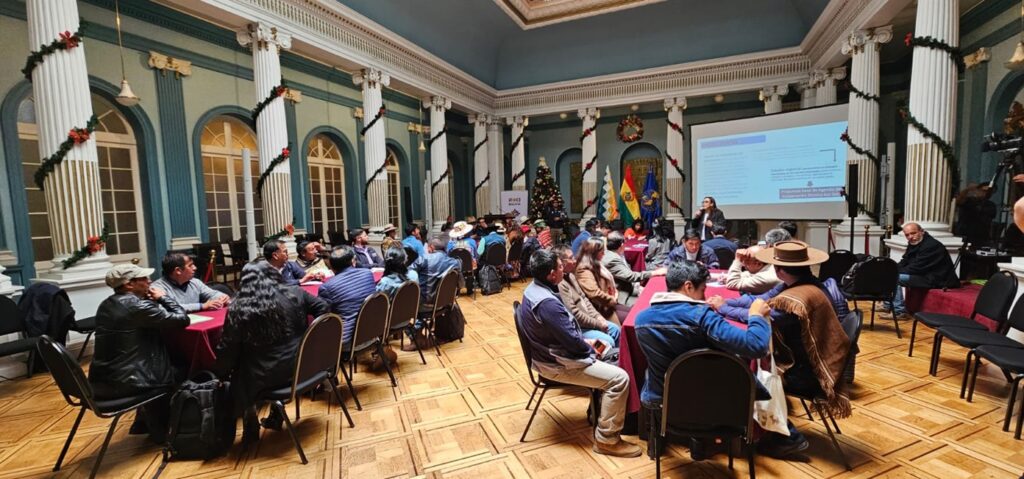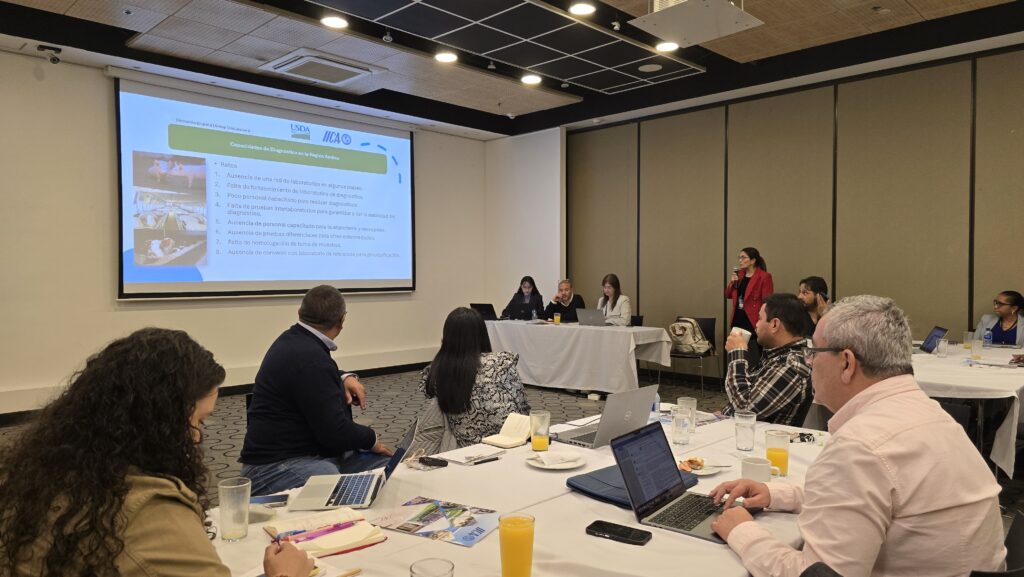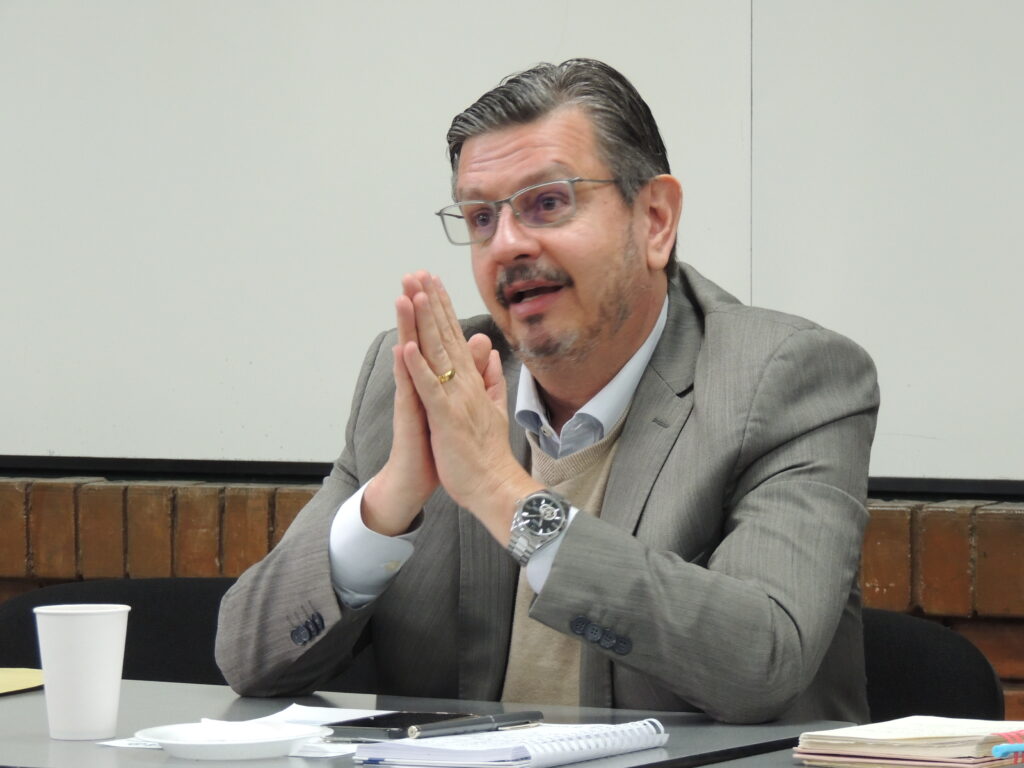En el Diálogo regional sobre ciencia, tecnología e innovación en los sistemas agroalimentarios de América Latina y el Caribe participan más de 100 especialistas de la Fundación Gates, CGIAR (una alianza global de investigación para un futuro con seguridad alimentaria, que busca transformar los sistemas alimentarios, terrestres e hídricos ante la crisis climática), Banco Mundial, FAO, IICA y otros organismos internacionales.
San José, 5 de mayo de 2023 (IICA) – El desarrollo de la ciencia, la tecnología y la innovación serán decisivos para definir el rumbo que tomará la transformación, que ya está en marcha, de los sistemas agroalimentarios de América Latina y el Caribe, sostuvieron autoridades y expertos internacionales durante un encuentro de alto nivel convocado por el Instituto Interamericano de Cooperación para la Agricultura (IICA), CGIAR y el Banco Mundial.
En el evento, que se desarrolla durante dos jornadas de trabajo en la sede central del IICA, en San José de Costa Rica, se señaló que resulta imprescindible impulsar el trabajo conjunto de los sectores público y privado para fortalecer los sistemas agroalimentarios de la región frente a los desafíos y oportunidades actuales.
Algunas de las necesidades prioritarias que se identificaron son la promoción de redes de innovación y el alineamiento en las políticas públicas; la construcción de agendas estratégicas de investigación y desarrollo; el fortalecimiento de capacidades institucionales, humanas, de servicios de apoyo e incentivos, y el impulso a cambios normativos y en el financiamiento de los sistemas nacionales y regionales de innovación.
En el Diálogo regional sobre ciencia, tecnología e innovación en los sistemas agroalimentarios de América Latina y el Caribe participan más de 100 especialistas de la Fundación Gates, CGIAR (una alianza global de investigación para un futuro con seguridad alimentaria, que busca transformar los sistemas alimentarios, terrestres e hídricos ante la crisis climática), Banco Mundial, FAO, IICA y otros organismos internacionales.
Están presentes miembros de la comunidad científica y secretarios ejecutivos de mecanismos americanos de cooperación para la ciencia, la tecnología y la innovación de los sistemas agroalimentarios, como el Programa Cooperativo de Investigación y Tecnología Agrícola para la Región Norte (PROCINORTE), el Programa Cooperativo para el Desarrollo Tecnológico Agroalimentario y Agroindustrial del Cono Sur (PROCISUR), el Foro de las Américas para la Investigación y Desarrollo Tecnológico Agropecuario (FORAGRO), el Fondo Regional de Tecnología Agropecuaria (FONTAGRO) y el Programa Cooperativo Regional para el Desarrollo Tecnológico y Modernización de la Caficultura (PROMECAFE).
También participan autoridades de los institutos nacionales de investigación y tecnología agropecuaria de los países de las Américas y de organizaciones de agricultores, las cuales cumplen un rol activo en los sistemas de innovación, entre ellas los Consorcios Regionales de Experimentación Agrícola (CREA) de Argentina y la Asociación Argentina de Productores en Siembra Directa (AAPRESID).
El rol de los sistemas agroalimentarios
La sesión de apertura del encuentro estuvo a cargo de Diego Arias, Gerente de Prácticas del Banco Mundial; Joaquín Lozano, Director Regional para América Latina y el Caribe del CGIAR; y Manuel Otero, Director General del IICA.
Arias se refirió a las distintas brechas que existen en la agricultura en cuanto a la inversión en innovación. “La primera tiene que ver con el tipo de agricultura. Tenemos un sector privado muy dinámico, invirtiendo en innovación con un fin comercial, pero el gran desafío es apuntalar la agricultura familiar”, señaló.
“La segunda es la geografía. Hay gran inversión en innovación donde existe más densidad de agricultores y de producción, pero la pregunta es cómo llegar a las áreas remotas. Finalmente, también hay dinero en las cadenas vinculadas a las exportaciones, que tienen ingresos en divisas, pero no existe la misma dinámica en las cadenas orientadas al mercado local”, agregó.
“Hoy –concluyó Arias- la agricultura está siendo llamada a atender varios objetivos simultáneos y eso es lo desafiante. En el Banco Mundial, cuando pensamos estos temas tenemos en foco la salud económica, la salud planetaria y la salud humana”.
Joaquín Lozano sostuvo que los sistemas alimentarios constituyen uno de los principales motores de desarrollo económico del mundo, pero eso es más acentuado en América Latina y el Caribe, donde el valor agregado del sector como porcentaje del PIB es actualmente el más alto desde 1995.
“Somos la región exportadora de alimentos más importante del mundo y nos toca asumir un papel muy importante para luchar contra el hambre a nivel mundial. Este reto va a ir creciendo porque para 2030 se estima que existirán 670 millones de personas sufriendo hambre”, afirmó.
En cuanto a los cambios de los sistemas agroalimentarios basados en ciencia, tecnología e innovación, Lozano consideró que es clave identificar cuáles son las necesidades tecnológicas y disponer de recursos para apuntalar las transformaciones, la generación de resiliencia y la innovación genética en medio de la crisis climática.
Por su lado, Manuel Otero hizo hincapié en la necesidad de construir una mejor institucionalidad en ciencia, tecnología e innovación, a los que calificó como temas decisivos para el futuro de las Américas y el mundo.
“Están ocurriendo cambios muy profundos. Hoy la agricultura tiene cada vez más desafíos, porque se suman los temas de seguridad alimentaria y nutricional con los de sostenibilidad ambiental o de seguridad energética”, afirmó.
El Director General del IICA dijo que los cambios ya se están llevando adelante en la región, pero exhortó a darles una direccionalidad y un sentido a esas transformaciones. “No tienen que venir de afuera los que nos digan cómo debemos cambiar la agricultura en nuestro continente”, señaló.
Otero enfatizó que los sistemas agroalimentarios de América Latina y el Caribe no son sistemas fallidos. “Ya estamos haciendo una agricultura más sostenible –afirmó- y tenemos que darnos cuenta de que somos el continente por excelencia para enfrentar los desafíos de la agricultura que se viene”.
“El IICA tiene en su ADN los temas de ciencia, tecnología e innovación. Estamos convencidos de que este es el tema crucial para construir un nuevo futuro para nuestro continente y su inserción en el mundo”, concluyó.
La importancia del sector público
El Director Emérito del IICA y Director de Agricultura del Consejo Argentino para las Relaciones Internacionales (CARI), Martín Piñeiro, subrayó que la tecnología es la fuerza transformadora principal del mundo.
Piñeiro dio una charla magistral en la que apuntó que, a pesar del crecimiento del sector privado, el sector público sigue teniendo un papel rector para el desarrollo de bienes públicos internacionales y para definir el marco de las políticas públicas para ciencia y tecnología.
“Nuestra percepción –señaló- es que eso se ha ido debilitando en América Latina, ya que hoy el presupuesto de los institutos de investigación es menor al 1% del PBI agropecuario. Hay enormes desafíos pero también tenemos una enorme oportunidad para repensar el sistema de ciencia y tecnología de los sistemas agroalimentarios en nuestra región, de manera de adecuarlo al nuevo escenario y alcanzar un gran desarrollo”.
Más información:
Gerencia de Comunicación Institucional
comunicacion.institucional@iica.int










